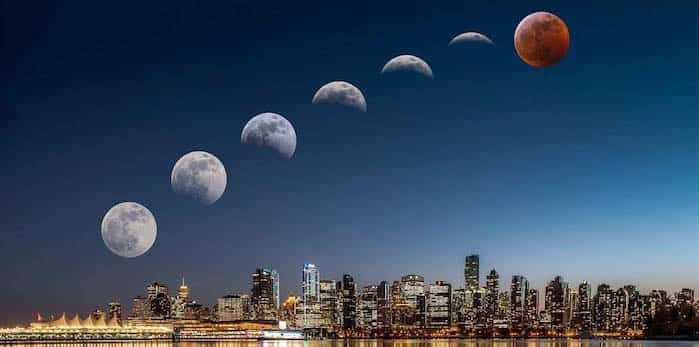Vancouverites looking to catch an awe-inspiring celestial display should mark their calendars for a rare lunar event in November.
The full "beaver" moon will be at its fullest in Vancouver on Tuesday, Nov. 8 at 3:02 a.m., according to timeanddate.com. You don't have to stay up until the wee hours of the morning to see it, however. The moon will appear full in the hours leading up to that time on the night of Nov. 7.
But the full moon won't be the highlight of the night.
As the moon reaches its fullest size, the celestial body will move under Earth's shadow, blocking sunlight from reaching its surface in a total lunar eclipse.
How to view the total lunar eclipse in Vancouver in November 2022
Marley Leacock, an astronomer at the H.R. MacMillan Space Centre, tells Vancouver Is Awesome that you don't need any special equipment to view the lunar eclipse — but you'll want to dress warmly.
"For viewing tips, my largest one is to dress appropriately for the weather," she said.
While the event lasts nearly six hours in total, the moon will only appear red for a portion of that time, Leacock notes.
The event starts just after 1 a.m. when the Earth's umbra (the dark, inner shadow of the planet) begins to cover the moon.
"The moon will turn redder as it goes from partially covered by the umbra to being completely covered, or total eclipse. Totality begins at 2:16 a.m., with the maximum occurring at 2:59 a.m," she explains.
The full eclipse ends at 3:41 a.m. when the moon begins to move out of the umbra, with the moon fully out of the umbra by 4:49 a.m.
"If people want to see the moon while it is red, the time to do that is anytime between 2:16 a.m. [and] 3:41 a.m."
Lunar enthusiasts should keep in mind that November's tempestuous weather conditions could prevent a clear view of the event. Check the forecast before you head out.
Why is the November full moon called a "beaver" moon?
The November full moon earned its namesake because it occurs during the time of year when beavers take shelter for the winter. Additionally, it was the time when fur traders would trap them for their "thick, winter-ready pelts," according to the Old Farmer's Almanac.
While it is commonly known as the beaver moon, it was also called the full frost moon by other North American Indigenous tribes.
Space enthusiasts will also have opportunities to go stargazing this fall in Metro Vancouver, too.
Not only will people have a chance to view a meteor shower that is known for producing "fireballs," but there will also be a couple of active meteor showers occurring at the same time.



